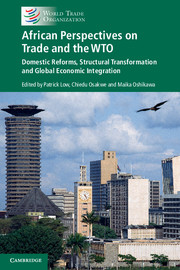 African Perspectives on Trade and the WTO
African Perspectives on Trade and the WTO from Part II - Africa’s Participation in the Rules-Based Multilateral Trading System
Published online by Cambridge University Press: 27 October 2016
International trade provides ample opportunities for the economic development of countries and regions. The fall in trade costs – communication and transportation costs, greater access to international capital markets, regional cooperation and, last but not least, the decrease in trade barriers – has supported global trade and output expansion over the last decades. Emerging opportunities and challenges resulting from technological, economic and political developments differ, however, from region to region. Historical experience shows that much of the progress in economic growth and development also depends on the readiness of local business and governments to rapidly adapt and seize opportunities.
This chapter examines a range of questions. How has Africa’s trade evolved since 1995? Did Africa’s trade expand in line with global trade, or faster? Did the region’s exports become more diversified in terms of product structure and market destinations? Did Africa’s trade increase its share relative to GDP? Some observers might argue that an analysis of a large region at an aggregate level can only be of limited value. More than 1 billion people live in Africa, populating over fifty economies that differ considerably in size, resource endowments, governance and openness. Nevertheless, a shared history, combined with common economic experiences and a shared evolving destiny justify a continent-wide analysis of certain trends in trade. This approach should not, however, detract from the reality of Africa’s rich diversity.
But there is also focus on a number of country experiences. The results of analysis indicate that, while they may not be representative, selected countries have recorded an above-average economic and trade growth record over the last decades, although they were broadly representative of the starting baseline for most African countries in 1995, with their exports dominated by agricultural products. The analysis examines what has changed in product and market structure, and factors that contributed to their above-average trade and growth performance.
To save this book to your Kindle, first ensure [email protected] is added to your Approved Personal Document E-mail List under your Personal Document Settings on the Manage Your Content and Devices page of your Amazon account. Then enter the ‘name’ part of your Kindle email address below. Find out more about saving to your Kindle.
Note you can select to save to either the @free.kindle.com or @kindle.com variations. ‘@free.kindle.com’ emails are free but can only be saved to your device when it is connected to wi-fi. ‘@kindle.com’ emails can be delivered even when you are not connected to wi-fi, but note that service fees apply.
Find out more about the Kindle Personal Document Service.
To save content items to your account, please confirm that you agree to abide by our usage policies. If this is the first time you use this feature, you will be asked to authorise Cambridge Core to connect with your account. Find out more about saving content to Dropbox.
To save content items to your account, please confirm that you agree to abide by our usage policies. If this is the first time you use this feature, you will be asked to authorise Cambridge Core to connect with your account. Find out more about saving content to Google Drive.